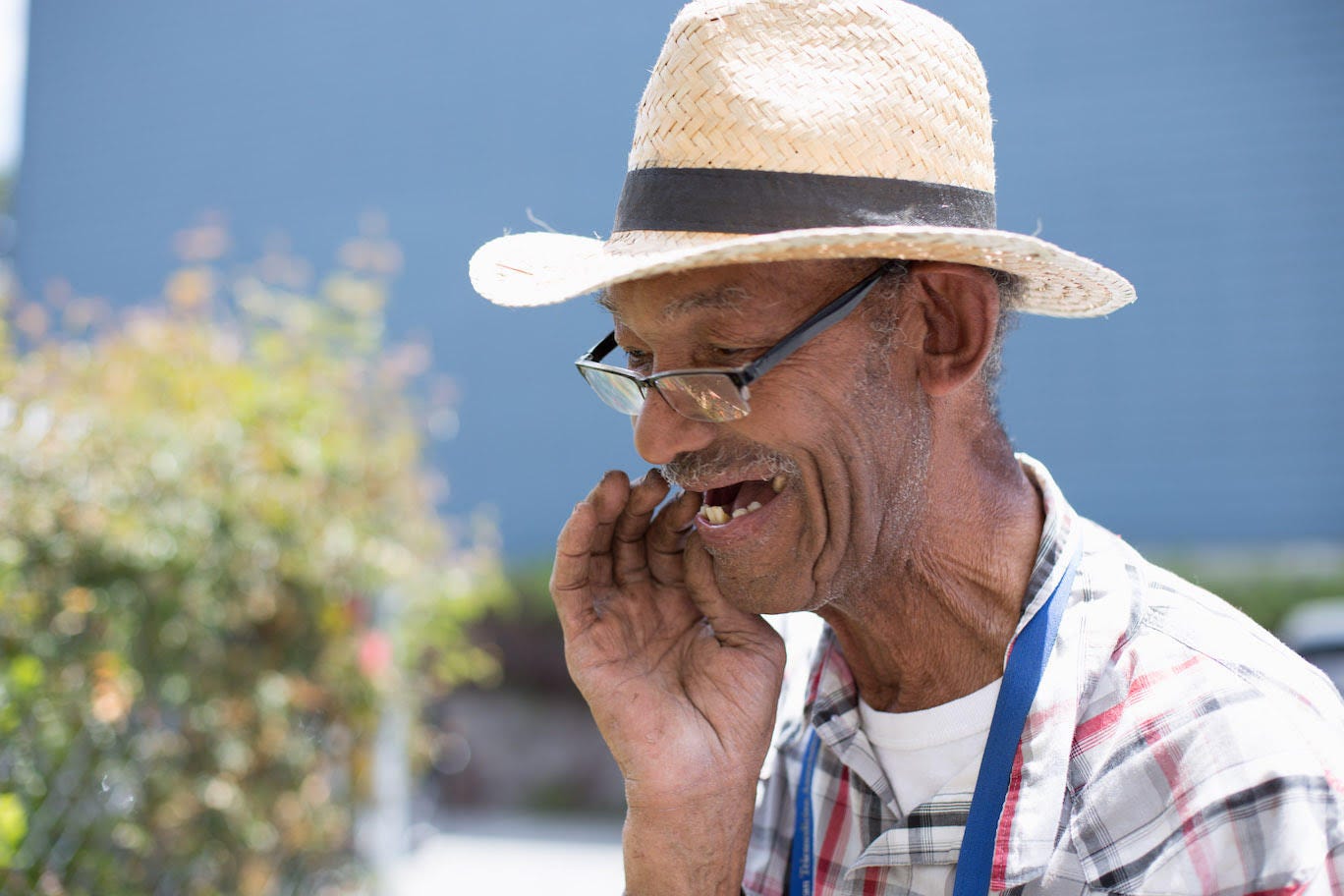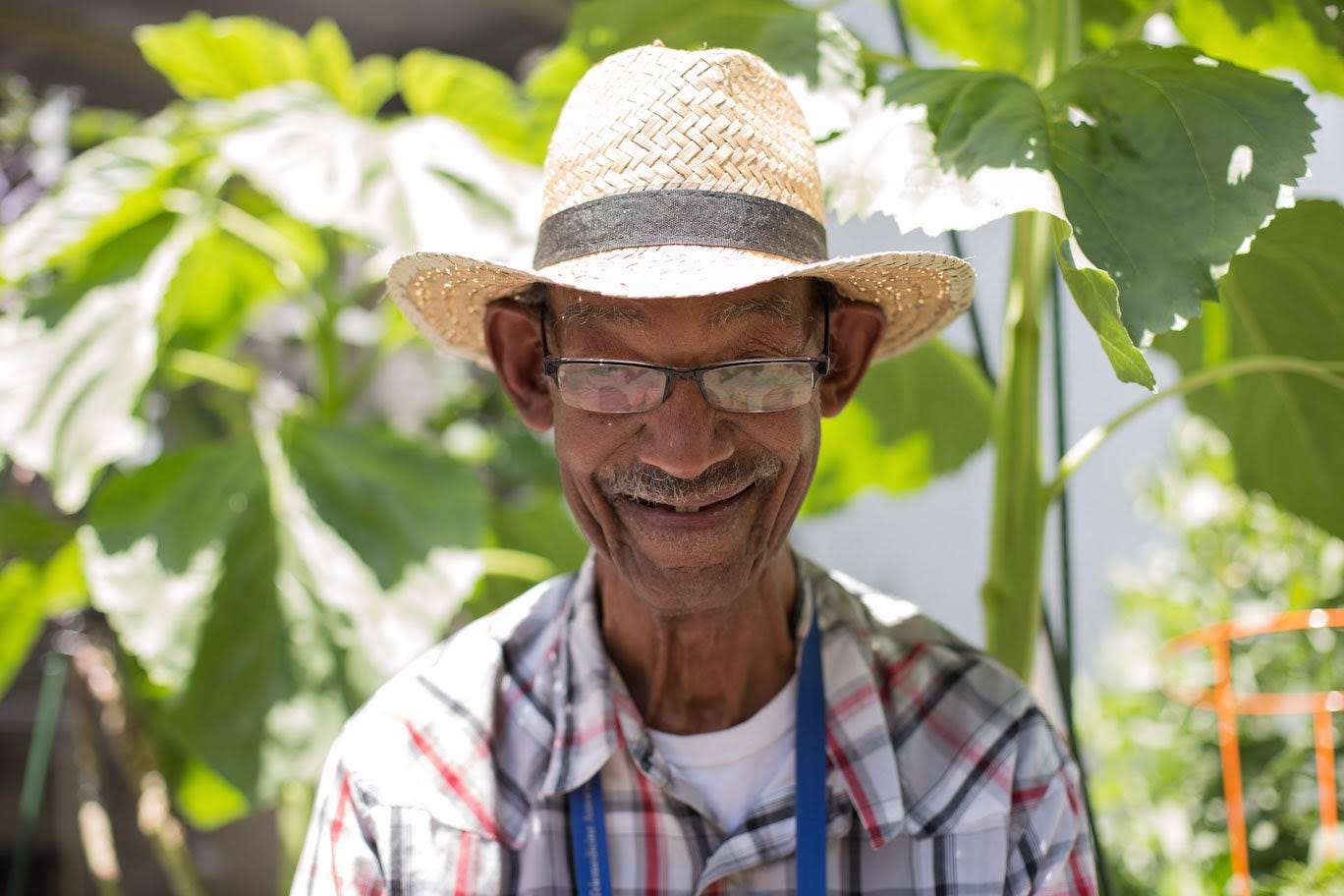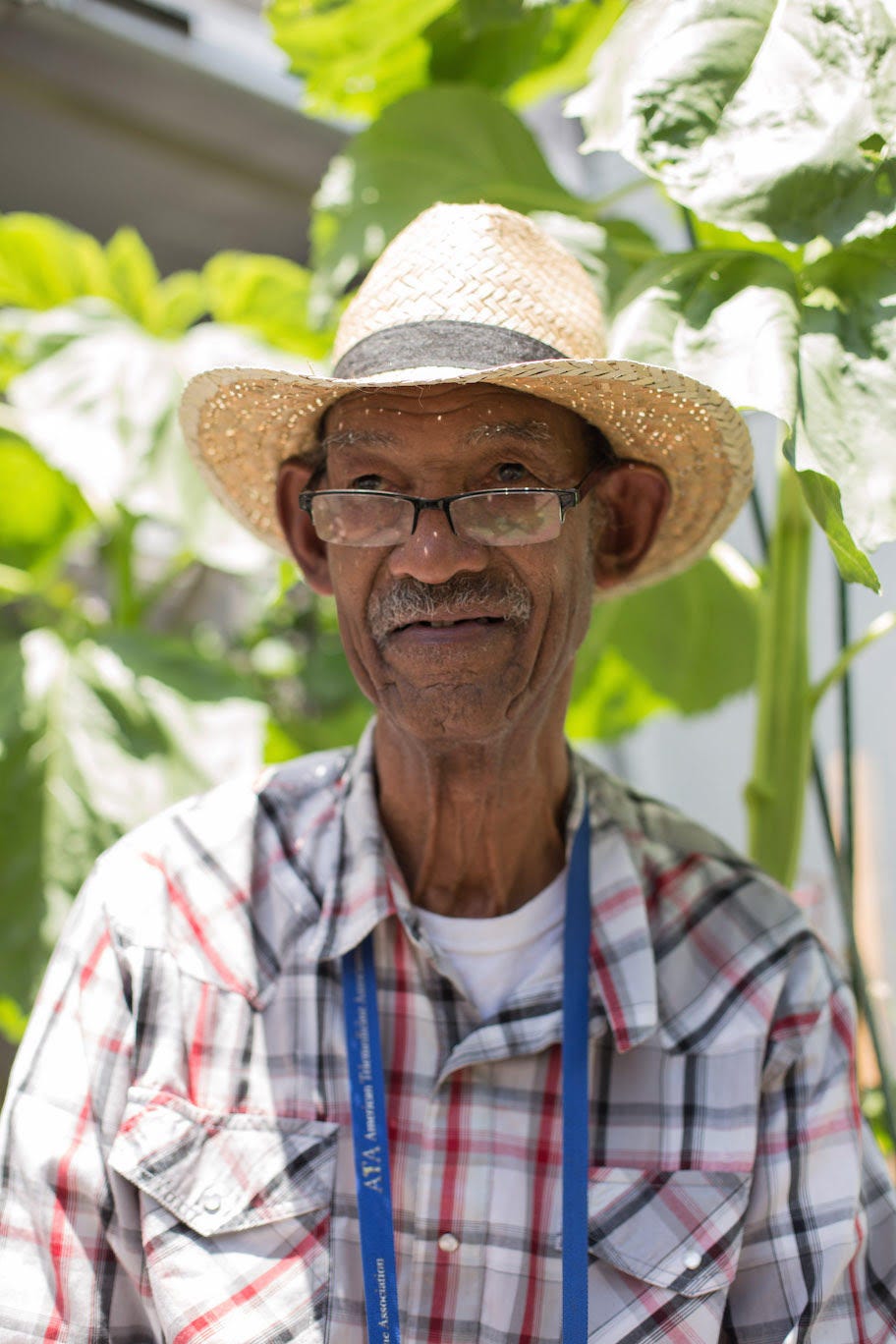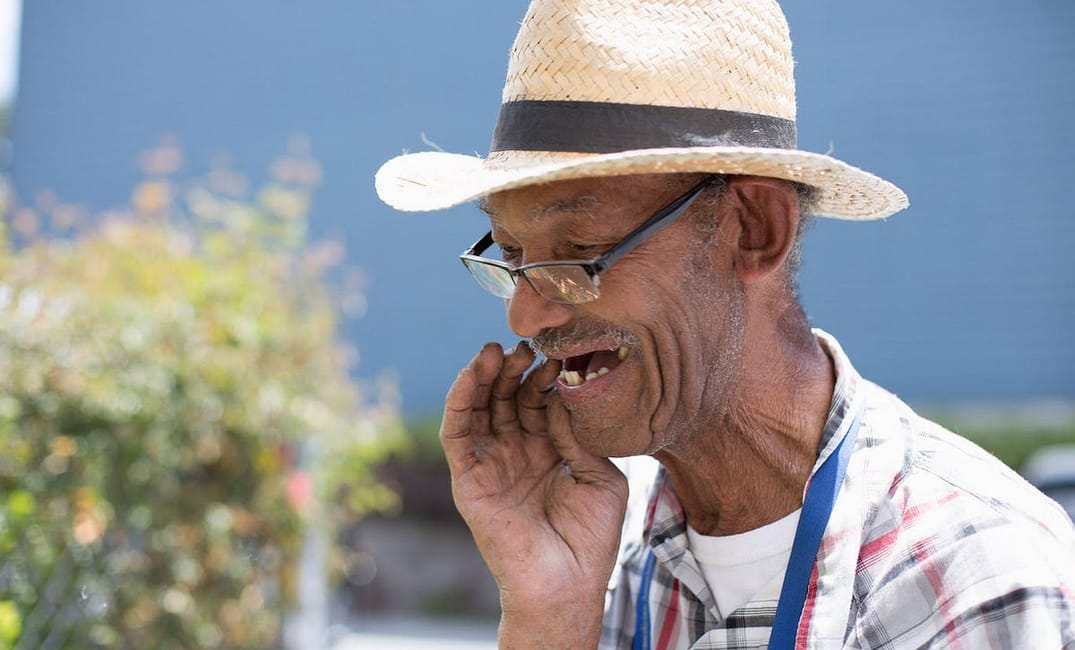By Lilian Wang

I’d met Monroe at Episcopal Community Services’ Tuesday breakfast support group for homeless seniors. He came by a couple of times a month with a toothless grin on his face, telling animated, long-winded stories about his childhood in Mississippi. But my first memory of him is of a triumphant win at bingo. The prize: a bottle of fragrance. With the perfume cradled in his arms, he performed a one-man show of his swooning women and his flirtatious conversations with them.
Monroe is no stranger to being a ladies’ man. Growing up, he chaperoned his sisters to high school events and became known for his moves on the dance floor (“I’m just clowning around,” he insisted). Today, when he gets up in the morning, he switches on the rock-and-roll radio station and dances in his single-room occupancy on Eddy Street. In the United States and Canada, a single-room occupancy, or SRO, refers to one or two tenant rooms with shared bathrooms and kitchens. In San Francisco, SROs are the most common form of affordable housing for formerly homeless individuals, which Monroe used to be.
Monroe tells me that “these old bones” wake up at seven every morning, but he doesn’t get up until he’s ready — because he can. When he lived with his niece in her Section 8 housing (rental housing subsidized by the federal government), he knew it wasn’t home. Now he can do whatever he wants. Now, with his turnips growing on his windowsill, a 28-inch television on his shopping list and the freedom to choose not to clean his room — to choose not to get out of bed just yet — Monroe is home.

When asked how he became homeless, Monroe hesitates before responding with a sigh: “Oh, you know … the drinking and all that.” More than 20 years ago, Monroe’s alcoholism led to unemployment — “God, man, I was dumb” — and since then, he’s become familiar with San Francisco’s homeless system. He explains that there are line-ups for nightly beds and lotteries for 30-day and 60-day beds. Homeless individuals call in to check if their numbers have been drawn. If not, then, he says, “You try again tomorrow; take it day by day.” In the meantime, he says, “Sometimes you sleep on a couch. Sometimes you sleep on the hard floor with the coldest blanket you wouldn’t believe.”
After about a week of hustling and hoping, Monroe secured a spot at the Sanctuary. He describes these nights as chaotic and crowded, with inebriated bedfellows and resident rodents, and being roused by people smuggling midnight snacks. “If you got there before, they’d give you food before you even go to bed,” Monroe says, exasperated. “But you know how people do.” He shakes his head and says, “You sleep. What you gonna eat for?” On cold and stormy nights, people begin to pile up, packed tightly in the damp, unheated shelters.
After living at the Sanctuary, Hospitality House — where a lice infestation was spreading — and on the street, Monroe moved to a hotel for $700/month. When his case manager advised him of vacancies at his SRO, Monroe was hesitant to move; some of the tenants had reputations. At his new home, when neighbors ask him what he does, he tells them that he’s a gardener. “What do you get high on?” they’ll persist. “Coffee, man,” he answers, “and sunshine and being happy. Whatever you got, I don’t need it. You do your thang; that’s your business. Just keep it to yourself.”
When he’s good and ready, Monroe walks to the bus stop, hops on for a couple of blocks and walks the rest of the way to Episcopal Community Services’ senior center on Natoma and 8th. He has coffee in the morning. Research has shown that one or two cups of coffee a day helps prevent dementia, he informs me. Then he joins in on the center’s exercise classes, stretching (though a practitioner from City College advised them to keep their fingers above the knees — “cuz we old,” as he explains) or dancing. The tango, the cha-cha-cha, the twist, Filipino cultural dancing : he relishes every one of them.
Lunch is served from 11:15 a.m. to 12:30 p.m. There’s a fluid and efficient order to the operations. Through an opening into the kitchen, the staff puts out each part of the meal. Volunteers seat guests, push cafeteria trays down the line, serve and repeat. Monroe is especially pleased when fish is on the menu. Tilapia, he explains, is the cheapest — cheaper than catfish and salmon — and he has a recipe for passion-fruit-glazed fish. After lunch, Monroe stays for bingo or activities like arts and crafts before spending three or four hours in the garden. “The garden is a sanctuary,” he tells me. “Sometimes I get in that garden, and I don’t know when to quit.”
Monroe also spends his days at the library, attending events at community centers and taking in the day — the music, the sailboats — at his favorite park on Beach and Hyde. He has “a few friends here and there,” but he calls himself a loner: “I’m a June bug, a Gemini. I get tired of them talking about their problems. I got problems. I don’t talk about them.”
Mostly, though, he gardens.
“Here comes the gardener. You talk to him. He’ll be talking about vegetables.” It isn’t easy to spend time with Monroe without the conversation slipping into a tangent about gardening. He tells me that sunchokes are flowers in the sunflower family, and that their tubes contain insulin. They’re a natural way to get the insulin that diabetes patients require. There’s a history of the disease in his family, from his nephew to his wife, who passed from complications related to it. His brother and four sisters have passed as well, from a medley of medical conditions. “Everybody’s gone,” he tells me. “I’m the last of the Mohicans.”

Monroe has a physician and visits San Francisco General Hospital or St. Francis when he feels out of sorts. When he’s hospitalized until the evening, he takes paratransit home, paying $15 for 60 rides. His niece, Camilla, hired him a caregiver, to be paid $200/month by the city, but “she doesn’t really come cuz I can take care of myself.” A spry 82 and lanky and slender, Monroe tells me that even though he takes four pills in the morning and one in the afternoon, he doesn’t have “nothing too serious.”
With Medicare, his medication costs $3.10 for a three months’ supply — a tenth of the regular price. His rent comes out to $488 — an increase of $9 since he moved in four months ago — leaving a little over $400 a month of his income from Social Security and Supplemental Security Income (SSI) to spend on clothes from Goodwill and cable-car rides.
He has never panhandled. “I don’t know how to beg.” Monroe says. “My dad ain’t teach me how to beg. You earn it.”
He’s been approached about the medication that he has access to, but he refuses to “share.” As he says, “You need it, you go get it. This medicine is for me; I paid for it, and I ain’t selling it. I would be hurting me and everybody else.” Instead, Monroe earns additional spending money through odd jobs, such as moving services or preparing for city events; the occasional entrepreneurial enterprise, such as reselling cigarettes; and volunteering. He’s volunteered at St. Anthony’s, Glide and Hospitality House, and in return, he’s received coffee, a place to sleep at night and tickets to 49ers games.
Walking around the Tenderloin, he sometimes runs into a relative or another familiar face. They tell him to “watch [him]self” and marvel that he’s still around. Monroe raises his eyebrows. “I’m older than dirt. But I’m still here, bro. I’m still trying to make it like you.”







